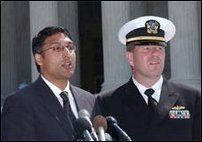
Battle for Equality, Liberty
[TamilNet, Sunday, 03 February 2008, 01:04 GMT]
While leading democratic presidential candidates have articulated defects in United States current approach to "war on terror," forewarning imminent changes to U.S. domestic and foreign policies, leading legal authorities in the U.S., acting as proxies to public interest and driven by Maslowian instinct, are battling in U.S. Courts to balance security and personal liberty by challenging Bush's national security policies. The judicial outcomes have a bearing on American Tamils, and contain illuminating lessons on civil society's struggle in a nation whose democratic governance is built on Montesquieu's doctrine of "checks and balances."
Challenges to new legislations, enacted to aid post 9/11 security needs, cover broadly three areas: inequality in treatment of enemy combatants, unconstitutionality of designations and material support to "terrorist" organizations, and privacy violations including wire-tapping.

Professor Neal Kumar Katyal, Commander Charles Swift
The Supreme Court, in a landmark June 2006 ruling, repudiated the Bush administration's plan to stand Guantánamo detainees on trial before military commissions, ruling broadly that the commissions were unauthorized by federal statute and violated international law.
The court held that a provision of the Geneva Conventions known as Common Article 3 applies to the Guantanamo detainees and is enforceable in federal court for their protection. This provision requires humane treatment of captured combatants and prohibits trials except by "a regularly constituted court affording all the judicial guarantees which are recognized as indispensable by civilized people," New York Times report said.
Professor Katyal, who argued for the defendant in this case says, "Hamden v. Rumsfeld addressed one particular question regarding the balance of rights and security, but it deferred for future resolution a second, substantively different, problem: discrimination against aliens."

Professor David Cole
David Cole, a professor of law at the Georgetown University Law Center, says that the return to a “preventive paradigm” of preemptively weeding out threats to national security, guilt by association has been resurrected from the McCarthy era... it is now a crime to support an individual or organization on a terror watch list, although the government can designate and freeze assets without a showing of actual ties to terrorism or illegal acts."
Cole identifies three main statutory regimes now being employed by the government to combat terrorism.
- Laws such as the USA PATRIOT Act Executive Order 13224 make it a crime to provide material support to an individual or organization on a terror watch list. “Material support” has been interpreted loosely to include peacemaking assistance to a group listed in Foreign Terrorist Organization (FTO). This statute effectively circumvents due process, which is conspicuously absent from the process of designation.
- The International Emergency Economic Powers Act (IEEPA). Although originally designed for embargoes, during the Clinton administration government started using it for anti-terrorist purposes, putting “embargoes” on political groups or individuals under suspicion. Again, in the absence of a hearing or notification of charges, this is a violation of due process.
- Immigration Law. An immigrant cannot support any group that has threatened to use a weapon. This law is retroactive.
First Amendment (Freedom of speech), Fourth Amendement (Right to privacy) and Fifth Amendment (Due process) have generally been the basis of challenge to the provisions of the terror statutes.
Cole suggests that concerned citizens do the following:
- First, we need to stand up for the rights of donors and the rights of recipients by insisting on a distinction between support for terrorist activities, which should be proscribed, and support for lawful activities, which should be permitted even if the group has been designated by the government as a blacklisted group.
- Second, we shouldn't be chilled. Many in the foundation community, many in the donor community have been chilled by unrealistic assessments of what the law requires and are chilled from providing perfectly lawful support to organizations and groups by the atmospherics of this set of laws rather than by the laws themselves.
- Third, we should not become part of this public/private enterprise, at least in so far as it treads on First Amendment rights.
- And finally, we should object on constitutional grounds that insist that there is a basic principle here. It is a principle that was forged in the McCarthy era and that is that it is very dangerous to go down the road of guilt by association; that that's the way that innocent people are harmed; that's the way that political freedom is curtailed. What we need to do is target individual culpability, not engage in guilt by association. 9/11 changed a lot, but it shouldn't change that basic principle.
The Supreme Court has insisted that the Fifth Amendment principle applies to legal liability based on both “status or conduct,” implicitly rejecting any distinction between association (status) and material support (conduct).
Professor Cole in his book on Terrorism and Constitution, under due process says: "The PATRIOT act gives the Attorney unprecedented power to lock up any immigrant that he certifies as a "suspected terrorist." The act also "expands ideological exclusion authorizing the government to deny entry to aliens for pure speech," Cole notes.
"Fourth amendement generally permits the government to conduct searches or wiretaps only when there is a probable cause to believe that an individual is engaged in criminal activity..." Prof Cole adds that the "PATRIOT act allows the government to evade this by amending Foreign Intelligence Surveillance Act (FISA) which creates a limited exception to the probable cause rule for foreign intelligence gathering."
FISA court, created in 1978 and modified in 2001 by the USA Patriot Act, reviews requests by the intelligence community to conduct national security-related surveillance, such as wiretaps, within the United States. It therefore stands at a nexus where security abuts privacy, and Supreme Court appoints members to this court.
Center for Constitutional Rights (CCR) is sueing the Bush Presidency for intercepting its email without securing a warrant first. The Center's lawyers argued that the warrantless wiretap program was: "... illegal because it lacks judicial approval or statutory authorization." This lawsuit aims to protect CCR attorneys' right to represent their clients free of unlawful and unchecked surveillance," according to CCR attorneys.
Katyal opines that "despite the waves of litigation and commentary charging that the Administration's actions are illegal to the core, neither the courts nor the public have reached the agreement in just over five years on how to balance individual liberty and national security," and recalls the words of Thomas Paine: "He that would make his own liberty secure must guard even his enemy from oppression; for if he violates this duty he establishes a precedent that will reach to himself."
Related Articles:28.09.07
Oregon judge voids Patriot Act provisions 08.09.07
US Patriot Act provisions struck down by NewYork Judge 12.07.07
Anti-terror Laws 28.05.07
Sloganeering Terror, Strategizing War 18.10.05
Constitutionality of Economic Powers Act challenged in US Co.. 30.09.04
U.S Court curbs FBI powers granted in Patriot Act
External Links:








